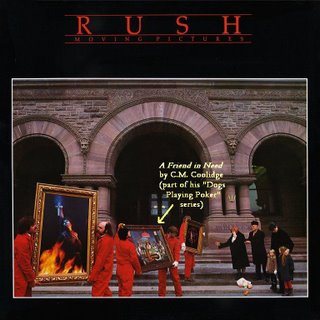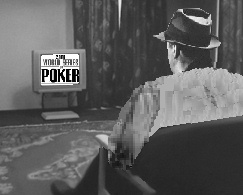WSOP Final Table Hand No. 60: Riding the Rush?
 Before reaching that huge hand between Jamie Gold and Richard Lee I found one other interesting hand involving two of the short stacks. Figures I would. To paraphrase a Chandler short story title, shorts stacks is my business.
Before reaching that huge hand between Jamie Gold and Richard Lee I found one other interesting hand involving two of the short stacks. Figures I would. To paraphrase a Chandler short story title, shorts stacks is my business.On the prior hand, Michael Binger had doubled up through Allen Cunningham thanks to a fortunate draw. Down to about 3 million (7th out of 7), Binger had raised to 700,000 UTG. (The blinds at this level were 100,000/200,000 with a 30,000 ante.) It folded around to Cunningham who called from the big blind. Cunningham checked the QJ8 flop, Binger moved all-in, and Cunningham called with ace-queen. Binger had ace-ten, and luckily for him a king came on the turn, filling his gutshot.
Now comes Hand No. 60. Binger is now the big blind, and his 6 million puts him in 5th place. At this point the seven players have essentially divided into upper and lower divisions, with Gold (37 million), Richard Lee (20 million), and Cunningham (11.5 million) all with large stacks and Douglas Kim, Binger, Rhett Butler, and Paul Wasicka all with short stacks (from 3 to 7 million).
As the hand begins, we watch from overhead as Binger carefully stacks his new chips into a symmetrical arrangement. Doyle Brunson is in the booth answering questions about the H.O.R.S.E. event. It folds around to Paul Wasicka on the button. Wasicka looks at his cards and spends twenty seconds or so counting out part of his chips before announcing he’s all-in. Cunningham folds in the small blind and the action is on Binger.
Binger looks at his cards and it is immediately apparent that whatever he has, he’s not ready to fold it instantly. He scratches his forehead and looks worriedly over in Wasicka’s direction. He rubs his eyes and audibly exhales. He momentarily bends forward and covers both ears with the palms of his hands. In short, he looks like a poor sap who has finally gotten up the gumption to ask his best girl to marry him and she just said let me think about it . . . .
In all, Binger deliberates about 30 seconds or so before finally saying “I call” and turning over his hand --

 . Wasicka turns over
. Wasicka turns over 
 , and Binger says “damn,” grimacing and shaking his head as if he’s trying to undo what he’s just done. “I can’t believe the ace-nine called here, do you, Doyle?” asks Gordon. (Brunson later says he’d rather have two face cards in that spot, “’cause the other guy figgers to have an ace.”) Nejad correctly notes that even if Wasicka didn’t have an ace here, Binger wouldn’t have been that big of a favorite against any two random cards. All agree the call was a major miscalculation by Binger.
, and Binger says “damn,” grimacing and shaking his head as if he’s trying to undo what he’s just done. “I can’t believe the ace-nine called here, do you, Doyle?” asks Gordon. (Brunson later says he’d rather have two face cards in that spot, “’cause the other guy figgers to have an ace.”) Nejad correctly notes that even if Wasicka didn’t have an ace here, Binger wouldn’t have been that big of a favorite against any two random cards. All agree the call was a major miscalculation by Binger. The board comes




 , and Wasicka has doubled up to 6.7 million or so. Meanwhile Binger has landed right back where he was two hands earlier, in last place with less than 3 million.
, and Wasicka has doubled up to 6.7 million or so. Meanwhile Binger has landed right back where he was two hands earlier, in last place with less than 3 million.Is there any defense for Binger’s play here? Perhaps not. I’ll offer what I think might be a partial explanation, though . . . .
When Wasicka moved all-in from the button, it was the fifth time he’d made a large preflop raise from late position (always from the button or the cutoff). That’s out of eight orbits or so. Binger is in the small blind when Wasicka is in the cutoff seat and in the big blind when Wasicka is on the button, thus making Binger acutely aware of what Wasicka has been doing. Having lost his blinds four times already, Binger had probably already thought to himself that the next time Wasicka pulled that move and he had any kind of hand at all, he’d consider looking him up. The fact that he had just doubled his stack perhaps made him even more eager to entertain the idea (since prior to Hand no. 59 he and Wasicka had been essentially even in chips the entire evening).
I really don’t think Binger was “riding the rush” here and acted recklessly after winning his first big pot of the night. No, I think his call was very likely at least somewhat premeditated. Of course, A9-offsuit is hardly the ideal hand with which for him to have made this play. But we’ve all been there . . . you’ve picked up an opponent’s betting pattern and have convinced yourself precisely how best to exploit it, but when the opportunity comes around certain factors (e.g., other players’ actions, your starting hand, what happened the hand before, etc.) compromise the play. All in all, I’m not faulting Binger too terribly here. Think how hard it would be to make correct decisions with all the various pressures (the money, the cameras, etc.). How’s it go? Living on a lighted stage approaches the unreal for those who think and feel . . . ?
Also worth noting here is how smartly Wasicka appears to have played his short stack during the latter stages of the tourney. Recall he was the player who began day 7 (the next-to-last day) way down in 24th place (out of 27) and managed to claw his way to the final table. While Gold’s successful handling of the big stack is getting most of the attention, Wasicka’s short-stack play during the last two days of the tourney is probably also worth some praise. (I believe I’ve read somewhere how Wasicka somehow managed never once to call a river bet at the final table, but I haven’t checked that out.)
Hand No. 122 coming up.
Image: Rush, Moving Pictures (1981) (adapted), Amazon.
Labels: *high society, Michael Binger, Paul Wasicka, Rush, WSOP



 .
.
 , thus giving him an open-ended straight flush draw.]
, thus giving him an open-ended straight flush draw.]  and Gold quickly says “check check” while looking at Cunningham. I’m not certain, but I think Gold might be implying that he’s confident Friberg is going to check behind him. In any event, it is pretty clear that Gold is primarily concerned with Cunningham here. Friberg indeed checks, and Cunningham fires out 2.5 million (into the 3.8 million pot). Gold calls quickly and Friberg folds.
and Gold quickly says “check check” while looking at Cunningham. I’m not certain, but I think Gold might be implying that he’s confident Friberg is going to check behind him. In any event, it is pretty clear that Gold is primarily concerned with Cunningham here. Friberg indeed checks, and Cunningham fires out 2.5 million (into the 3.8 million pot). Gold calls quickly and Friberg folds.


 . Nassif was right. Meanwhile he's way behind with the
. Nassif was right. Meanwhile he's way behind with the  .
. , and Gold gives Nassif a hug. “I had a blast,” says Nassif as he shakes hands with all of the other players.
, and Gold gives Nassif a hug. “I had a blast,” says Nassif as he shakes hands with all of the other players. . My initial response is to feel slightly uneasy. Pocket jacks on level 1 sometimes spells an invitation to danger. Sort of like having the boss’s wife openly flirt with you at the Christmas party. Steel yourself, Shamus. Remember, it’s not worth it . . . .
. My initial response is to feel slightly uneasy. Pocket jacks on level 1 sometimes spells an invitation to danger. Sort of like having the boss’s wife openly flirt with you at the Christmas party. Steel yourself, Shamus. Remember, it’s not worth it . . . .

 . Oof! Quads. It checks around to me and I decide to check as well, hoping somebody makes something on the river so I can get some action here. (Not necessarily the correct play, but the stakes are only 20/40 and I’m not making a lot on this hand anyway unless someone hits something . . . I’m pretty sure no one else cared much for that second jack on the board.) The river was the
. Oof! Quads. It checks around to me and I decide to check as well, hoping somebody makes something on the river so I can get some action here. (Not necessarily the correct play, but the stakes are only 20/40 and I’m not making a lot on this hand anyway unless someone hits something . . . I’m pretty sure no one else cared much for that second jack on the board.) The river was the 

 I got out in the face of a reraise (the hand was won by the player to my left who cold-called me with
I got out in the face of a reraise (the hand was won by the player to my left who cold-called me with 
 . Nice. I bet, he called. Must have an ace, I thought. Or perhaps a gutshot and picked up a club draw here or something. I’m also thinking this is the hand where I’m gonna get healthy. The turn is the
. Nice. I bet, he called. Must have an ace, I thought. Or perhaps a gutshot and picked up a club draw here or something. I’m also thinking this is the hand where I’m gonna get healthy. The turn is the 
 . Criminy! I’m down to 98 chips.
. Criminy! I’m down to 98 chips.
 and I’m all in again. An eight falls on the turn, and that’s good enough to beat my two opponents in the hand, both of whom had small pocket pairs. A few hands later I’m up to 1,070. Meanwhile the other short stack had started to drop, actually slipping down below me to 608 chips. (The other two left were around 8,000 and 3,000.) I may actually cash in this sucker, I thought. I soon get
and I’m all in again. An eight falls on the turn, and that’s good enough to beat my two opponents in the hand, both of whom had small pocket pairs. A few hands later I’m up to 1,070. Meanwhile the other short stack had started to drop, actually slipping down below me to 608 chips. (The other two left were around 8,000 and 3,000.) I may actually cash in this sucker, I thought. I soon get 













